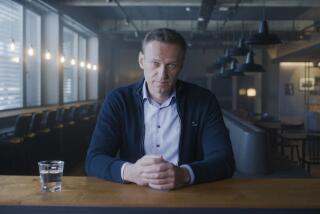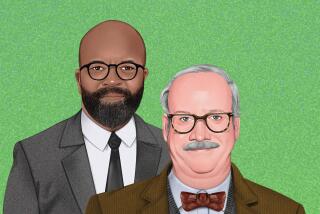ACTOR DYNARSKI SEES ANOTHER SIDE OF STALIN
- Share via
Gene Dynarski has always had a soft spot for Joseph Stalin.
Perhaps it’s an affinity for the Slavic subject matter. (The actor’s grandparents came from Poland.) Or the identification with a parochial school education. Or the fact that, like Stalin, his roots are in the working class: growing up in a slum area, his father a laborer who, more than occasionally, liked to get drunk. Or perhaps it’s politics: As Dynarski says, “I’ve always been interested in socialism, been on that side of the fence.”
The comparisons are close enough, and Dynarski’s acting fills in the rest. Currently, he’s playing the Soviet leader in David Pownall’s “Master Class” (at the Odyssey Theatre), a fictional account of a 1948 after-hours confrontation between Stalin, his minister of culture, Andrei Zhdanov, and two leading Russian composers of the day, Sergei Prokofiev and Dmitri Shostakovich--whose new, “formalist” music horrifies the traditional sensibilities of their leader.
In Stalin, “You have a man of limited background, but a genius through his own efforts: of grit and pushing, getting behind the revolution and manipulating himself in,” Dynarski said. “So when he comes up against a stone wall (the composers’ resistance), he cannot deal with it. When he says that millions and millions of people need this cultural or economic thing to happen, he sees it--and you must see it too. If you don’t, to hell with you.”
The Brooklyn-born actor, 53, added that he doesn’t reconcile Stalin’s malicious bullying of the two men, “but I understand it. And by the time we’re talking about--it’s five years before Stalin’s death, he’s 67 and saturated with his own power--the purges, all that stuff, have taken their toll in terms of sanity. I think if you give a person so much power, so many problems and so much guilt, it really does make for craziness.”
And, in fact, what the play ultimately reveals of Stalin--the depth of exhaustion and sadness beneath the calculated, bombastic, almost cartoonish exterior--results in a largely sympathetic portrait.
“Stalin was kind of a revolutionary in the seminary,” Dynarski said. “He read books he wasn’t supposed to be reading, played music he wasn’t supposed to play. No matter what you think of his methods--and, sure, some ugly things went on--there was a lot of justification for what he did, allowing for his givens and what he had to do. It was a horrible responsibility, and it was all his. There’s no coincidence in Pownall’s references to Christ: the idea that Stalin takes on the guilt of those 20 million dead, as Christ took on the cumulative guilt of mankind.”
Although the play deals with hard themes and requires some equally hard acting (last weekend Dynarski pushed his voice into hoarseness), it is nevertheless proving a welcome artistic workout for him. In town since 1957, he entered acting via classes at Los Angeles City College, Harbor College and UCLA (where he won honors for his roles in “Lazarus Laughed,” “Right You Are If You Think You Are” and “Rhinoceros”), and in 1979 finished building his own theater in Hollywood (where a new musical, “The Good Life,” opens Wednesday).
Has having his own space been a dream come true?
“Not really,” he said pleasantly. “It’s hard to be around it all the time. I used to go to shows and movies every night, just to get away. You see, I live in the theater--have ever since it opened. There’s no separate space; I just find little nooks and crannies to be in. They used to call that bohemian. Actually, when I first built it, I was pretty paranoid about break-ins and I didn’t want to pay apartment rent anyway. But I probably will move . . . sometime.”
Dynarski smiled broadly. “Maybe when I get my big break.”
More to Read
The biggest entertainment stories
Get our big stories about Hollywood, film, television, music, arts, culture and more right in your inbox as soon as they publish.
You may occasionally receive promotional content from the Los Angeles Times.










